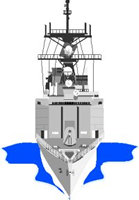
|
From Draft NOtices, January-February 2001 IN SERVICE TO THE NATION? — Mary Zepernick "Their tragic loss reminds us that even when America is not
at war, |

|
|||
|
Referring to the deaths on the USS Cole as a tragic loss, President Clinton spoke truer than he knew. My Webster’s defines tragedy as "a serious play or drama typically dealing with the problems of a central character, leading to an unhappy or disastrous ending brought on, as in ancient drama, by fate and a tragic flaw in this character, or, in modern drama, usually by moral weakness, psychological maladjustment, or social pressures." Macbeth is a classic example, his greed and power-mania making him the agent of his own undoing. The men and women killed on the Cole do not fit this description, but tragedy almost always leaves victims in its wake. So who is the central character in this drama? The bombers? If the efforts of U.S. intelligence agencies succeed, they will quite deservedly be undone by their deed. However, if we are to learn the lessons that tragedies invite, we must look closer to home. President Clinton claims that "America is not at war." Yet the USS Cole, a guided missile destroyer, was refueling in Yemen on its way to the Persian Gulf, its mission to support economic sanctions against Iraq. The Gulf War has continued for ten years, transforming in 1991 to an assault on Iraqi civilians — a violation of the longstanding Geneva Convention. The United Nations and others estimate that the sanctions are responsible for over one million deaths and counting, including some 500,000 children under the age of five. Barely covered by a UN fig leaf, the U.S.-led sanctions have been disavowed as immoral and futile by a growing number of nations and UN officials. "We are destroying an entire society. It is as simple and terrifying as that," said Denis Halliday, former UN coordinator of the Iraq Oil-for-Food Program and Nobel Peace Prize nominee. In a May 1996 "60 Minutes" interview, Leslie Stahl asked Madeleine Albright, U.S. Ambassador to the UN at the time: "We have heard that a half million children have died [as a result of economic sanctions against Iraq]. . . . Is the price worth it?" Albright replied, "I think this is a very hard choice, but the price, we think the price is worth it." Systemic character flaw? Official moral weakness? National psychological maladjustment? Iraq is not the only scene of misbegotten policy. According to an October 18 editorial in the San Francisco Chronicle: Among the many foreign policy issues you won’t hear mentioned by any of the presidential candidates is the fact that the United States is planning to build a military base in El Salvador. As the U.S. Army prepares to enter the civil war raging in Colombia, American military strategists are searching for a military beachhead from which to supply troops sent to Latin America. Many Salvadorans are justifiably wary about the prospect of a new American military base. Twenty years ago, the United States supported an authoritarian right-wing government whose death squads waged one of the harshest anti-insurgency campaigns against leftist guerrillas in Central America. . . . Now former guerrilla fighters, who just last March won the majority of seats in the National Assembly, fear that the United States will attempt to undermine their electoral success. Their concerns are legitimate. In the wake of the Cole deaths, a U.S. admiral said that naval personnel "recognize that there is no higher calling than service to their nation." However, we also serve who struggle to change flawed and failed policies; patriotism is not a blanket exemption from moral judgment and behavior. As in Vietnam, those who pay the price are not those who make the policy. The United States — with help from both its allies and enemies — too often wreaks death and destruction in the name of peace, freedom and democracy. Thus tragedies come home to haunt us in myriad ways. Amidst the sanctimonious pronouncements by public officials and editorials, honesty is the most fitting memorial to the 17 sailors. They didn’t deserve to die. The murderous policy that sent them to the Persian Gulf does. This column originally appeared in the November 3, 2000, issue of the Cape Cod Times. Mary Zepernick is co-chair of the Challenge Corporate Power, Assert the People’s Rights campaign for the Women’s International League for Peace and Freedom and is a member of the Program on Corporations, Law and Democracy. Her columns appear biweekly. This article is from Draft NOtices, the newsletter of the Committee Opposed to Militarism and the Draft (www.comdsd.org). |
||||